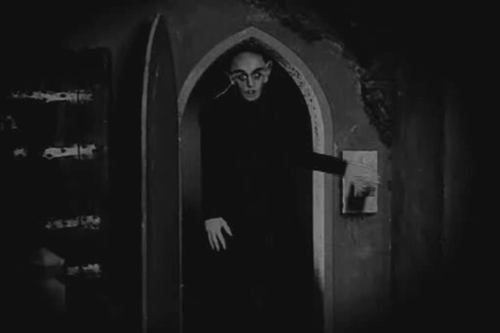The only knowledge I had on Nosferatu prior to watching the movie was that the count was a creepy vampiresque character that had made an appearance in Spongebob. This probably wasn’t a solid basis for understanding the movie, but I continued anyway with the thought of a man flickering a light switch in the back of my mind. I couldn’t help but chuckle at the special effects and the attempt to make something scary that was so innately humorous. I found Harker to be way too happy, like he was trying to compensate for a lack of voice with an ear-to-ear smile. I found myself criticizing the rate at which people in the 1920s read. I didn’t understand if the silent movie’s target audience was that of the near blind or dyslexic. However, in the end, I decided that for something like Nosferatu, the setting in which you watched the movie was crucial to your reaction. My first viewing took place sitting with friends, and criticism and laughter were our immediate reactions. Yet, upon sitting and watching the film alone I found there to be something so fundamentally eerie about what was happening.

There is something to be said about the idea of a society being picked off by something unknown. There is a feeling this type of idea evokes that goes beyond any black and white man flicking a light switch. It is an idea of the unknown that slowly creeps under your skin and leaves you with a sense of defenseless fear that stretches beyond time. I have always been interested in movies of this sort, where a society faces a plague and works in a rush to figure out what the heck is happening. Although the immediate scene may not have been scary, the slow build up of the music and the addition of Bram Stoker’s text put a feeling in the back of my mind that slowly manifested itself. Even though I felt no inclination to rush out of my room, I still felt the familiar goose bumps slowly rise up from the bottom of my spine to the back of my neck.

I wouldn’t necessary define my feeling as fear, because that, to me, involves an immediate reaction. However, I did feel something… and the presence of any feeling at all surprised me. The blend of dramatic music and the blurred lighting of the film really allowed for interpretation and I think this is where the movie thrives. I don’t think that Nosferatu has the ability to produce an immediate reaction with stop motion special effects. However, where the movie did its best was in the tip of your spine slowly rising as the pressure and suspense built and I admire so much that a silent film could acomplish this. It was the same feeling I got as a kid watching goosebumps.

On a more unrelated note, while watching the movie I came to a conclusion on attention deficit disorder. While watching the movie, I began to think that our media today is so concerned with constant and immediate stimulation. Everything we do in our world involved quick flashy interaction. It may be that I have lived in NYC my entire life, but I see this everywhere, from advertisements to our daily journey on the subway. This silent film allowed me to realize how dependent on stimulation we are. The computers, televisions and videogames we interact with provide an array of flashing lights that come at our eyes quicker than we can comprehend. I don’t think this part is a theory; T.V. works to display flashes of different colors of light so quickly that we don’t even see the transitions and instead perceive a solid image. We need so much engagement to stay interested in something and it seems like the rate of the movie left people laughing or bored to tears. Even so, this is why I admire this movie so much. Its has the ability to transcend time and even if it produced a tenth of the feeling the special affects of modern day do, that would be incredible.


Works Cited:


I agree with your point that Spongebob introduced you to Nosferatu. I also got annoyed with the amount of time the text was left on the screen, as I was finished reading it long before the movie continued. The slow build up of music definitely enhanced the atmosphere of the movie, and created a mixture of emotion that depended on what was happening on the screen at the time. Your point about the reliance on stimulation brings further thought into how dependent we are on technology.
In your first paragraph, you mention Harker. I agree that he was overly happy, but I also think that part of this emotion that he evoked was overconfidence. He laughs at the book of vampires that he finds in his room and scoffs at the mention of phantoms. While he smiles doing this, it isn’t joy that he is expressing – it’s overconfidence, perhaps as a psychological defense mechanism against fear.
I like the observations that you made in your final paragraph. In particular, modern movies switch scenes much more often – they don’t dwell on the same scene as much as older films did. Oddly enough, Spongebob relates to your comment in a different way – it has been mentioned that because of Spongebob’s quick scene changes, children who watched it developed lower attention spans. I found myself fighting the impulse to skip ahead in particularly slow scenes in the film – perhaps Spongebob has affected me more deeply than I thought.